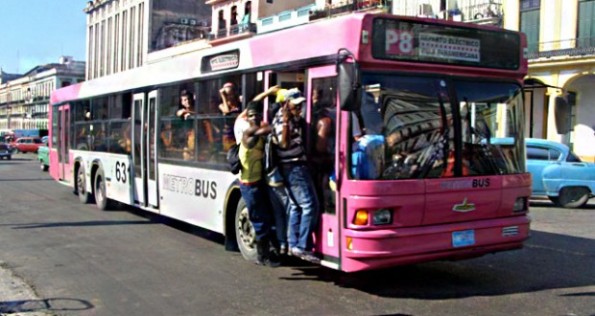 While in Sao Paulo and other cities in Brazil the outraged people flooded the streets to protest the increase in transportation prices, rampant corruption and the millions in public expenditures for the World Cup and the Olympic Games, in Cuba the men garbed in olive-green govern at their pleasure, supported by a hard autocratic staff and a Constitution that prohibits strikes and anti-government marches.
While in Sao Paulo and other cities in Brazil the outraged people flooded the streets to protest the increase in transportation prices, rampant corruption and the millions in public expenditures for the World Cup and the Olympic Games, in Cuba the men garbed in olive-green govern at their pleasure, supported by a hard autocratic staff and a Constitution that prohibits strikes and anti-government marches.
Because of a twenty cents increase in public transportation, the Brazilian people took the streets. The Castros’ ability to perform ideological somersaults is indisputable. And they are masters in selling a discourse of effort, honest and sacrifice, while living like millionaire capitalists.
The power of the autocracy cannot be quantified. Or can it? A magnate like Bill Gates could be a ruthless monopolist and evade taxes, but he does not control the strings of foreign policy making or with just a simple phone call send a dissident to jail.
The Cuban autocrats do have real power. They control the State in an absolute manner thanks to a network of special services, informers, neighborhood organizations that with a simple order can start an act of repudiation or provoke the beating of any opponent.
Even in former communist countries like East Germany, Czechoslovakia or Hungary, there were workers striking and mass demonstrations, crushed by the treads of Russian tanks and bursts from Kalashnikovs. In 54 years of the Cuban regime there has never been a general strike in the island.
One of the few exceptions was the rebellion of August 5, 1994 in the largely poor and majority black neighborhoods of Cayo Hueso and San Leopoldo in Central Havana. The detonator for the protest — known as “el Maleconazo” — was the desire of people to leave the country. They weren’t asking for political changes, better wages nor demanding that the government hold free elections.
Due to the scientific repression, many Cubans are devious pretenders. If the gate of an embassy opens, as with the Peruvian embassy in April 1980, those same people would leave their red Party card at the door.
Or they would play the game of mirrors learned over decades. They take cover behind political speeches, revolutionary jingles, raise their hands in unanimous consent at a union meeting or respond to a call from the intelligence services and shout vulgarities at the Ladies in White.
The majority of the Cuban population is peaceful. Too much so. Some prefer to take a rubber raft and risk their life crossing the dangerous Florida Straits rather than to become affiliated with a dissident group. With harsh words they criticize the government in public buses or private taxis or maybe while drinking the cheapest rum with their friends or in living rooms in their homes; but that’s it.
If we compare ourselves with Brazil, Cuban could have seen several strikes and lots of massive protests of the outrages. The minimum salary in Brazil is $678 reales or $326 dollars. In Cuba it is $20 dollars.
If you need to buy a home appliance, you have to have access to convertible currency or CUC, a currency in which workers or retired people do not get paid. The products sold in stores for that currency and are taxed between 240% and 300%.
A jar of mayonnaise, made in Cuba, is one-third of the median salary. A bag of frozen potatoes is pretty much the same. From 2003 to date many items sold in hard currency have increased between 40% to 90%.
One hundred dollars in 2003 represents forty-five dollars in 2013, due to the 13% tax levied on the US dollar, decreed by Fidel Castro in 2005, along with the silent price increases for staple products.
In contrast, wages have barely grown in the last twenty years. The sending of remittances by family members from the “other side of the pond” is what supports the basic needs of their family in the island.
It is predicted that in 2013 the regime will receive more than $2.6 million dollars from these remittances. At the same time, the registers at the stores are happily chirping and the subsidies from the State are decreasing. The message from the rulers is loud and clear. Make ends meet however you can, establish a small place to refill lighters or fix old shoes.
The bus fare in Cuba, the genesis of the riots in Brazil, have risen from five cents in 1989 to forty cents in 2013. However, due to the tremendous scarcity of twenty-cent coins, people are paying one peso. To travel in an overflowing bus and with a horrific service.
Nobody has taken the streets to protest. The mute revenge of Cuban workers is to work little and poorly and to steak what they can from the jobs. Fidel Castro never liked democracies. The strikes, protests and free elections give him allergies.
One afternoon during the 1990’s, it is said that someone whispered in the Nicaraguan politician Daniel Ortega’s ear, after his loss in the referendum: you don’t hold elections to lose. Ortega and the compatriots of the PSUV in Venezuela took note.
Cuba, which economically speaking is a failure, has shown that only an autocracy can keep popular discontent in the dark.
If anyone wants some advice as to how to run a country without disturbances, please come by Havana.
Ivan Garcia
Picture from Primavera Digital
Translated by: LYD
18 September 2013
